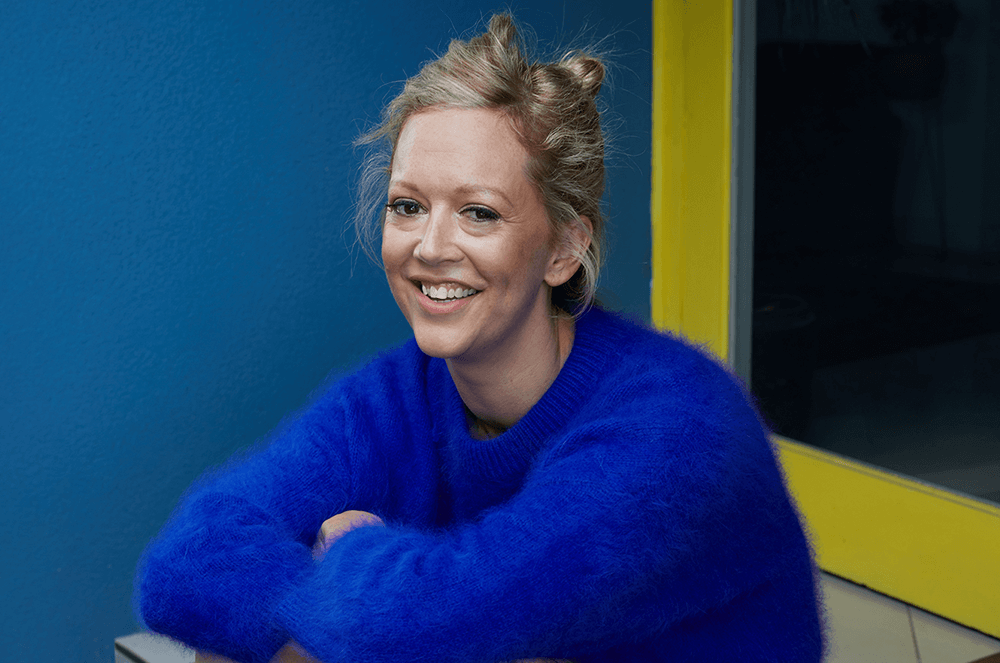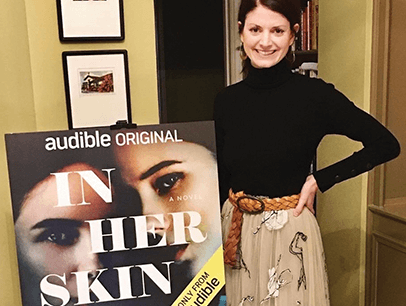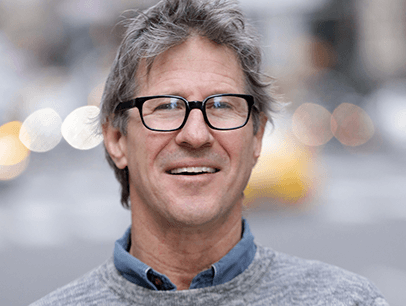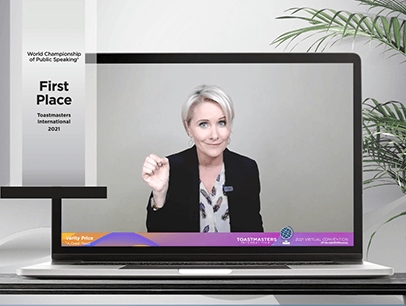
In this Toastmasters Podcast episode, author, podcaster, and engineer Katherine Collette talks about her fictional novel set in a Toastmasters-like world. Click play to learn more about Collette’s Toastmasters experience and find out what led her to write what she describes as “a love letter to Toastmasters.”
Katherine Collette has set her second novel, The Competition, in an environment familiar to many Toastmasters: a speech contest. In fact, there is a lot that members will recognize in the book, from the competition rules to the convention to the competitors.
A member herself for four years, and with Toastmaster parents, she knew that a Toastmasters-like experience would be a good setting for a book. And while the characters and the plot have many qualities that Toastmasters will recognize, there are differences as well, which allowed Collette to exaggerate certain aspects for the plot.

The Competition was published in Australia in February 2022 and was selected for the Queensland Writers Centre’s Adaptable program. Collette’s first book, The Helpline, was longlisted for the 2019 Indie Book Awards. She is also co-host of The First Time podcast.
What is your book about?
The Competition is set in the world of competitive public speaking and takes place across four days, during which hundreds of competitors compete to be crowned Australia’s best speech maker.
There are two main characters. Frances is in her early 20s and wants to win the prize money. Her plot revolves around bullying, as well as learning to tell the truth and owning her story. Then there’s Keith, a recent retiree. He’s desperate to win, more for the glory and to win his wife back. Keith is very celebratory about public speaking and clubs and has been around for a long time.
What made you suspect that a speech contest would be a good setting for a novel?
I like the freedom that fiction affords to explore different issues, and I liked that the setting is in a Toastmasters-like world, but it’s an exaggerated Toastmasters world. I thought a lot about the value of public speaking clubs in that it teaches you to speak, but it’s also a listening club in some ways. There is this real beauty in listening, and having people tell stories that they wanted to tell that are sometimes surprising, sometimes confronting, sometimes thought-provoking.
I really loved exploring that idea. Some of the stories you hear in Toastmasters club meetings are incredible. I think there’s something powerful in giving a person space to say whatever they want to say. And it can be surprising what they choose to talk about. It’s often deeper and more personal than you would ever ask questions about.
Once you start doing contests, it becomes so refined and so choreographed in some ways. Competitions are really distinct from club meetings, and it was interesting to understand what motivates people to compete. They joined a club originally for one reason, but there was a turning point where they loved public speaking so much that they wanted to get really good at it.
How did you research this book?
I began doing speech contests. I entered all of them. I went the furthest in the Humorous Speech Contest. I ended up getting coaching when I realized it would be so useful to have feedback. [My coach] was fantastic; she was a former Toastmaster who had competed internationally. That was a big turning point.
I also talked to a number of different people. I talked to a well-known judge. I spoke to a lot of people who did competitions. I spoke to a world champion finalist, a coach, and people who had been involved in clubs for a while.
I also received a grant to go to the 2019 International Convention in Denver, Colorado. That was special anyway, but particularly given what’s happened since 2019. It was such a great moment.
What parts will Toastmasters recognize and what did you fictionalize?
I wanted to show the positivity, the level of encouragement, and that genuine desire to see the best in people. Toastmasters is about helping people grow, but it’s also about acknowledging what people can already do. I also wanted to capture a level of awkwardness. Inherently, a public speaking club is going to have a layer of awkwardness because people are trying something that they’re not good at. That is hard to do. It’s inevitable, but it’s also necessary because if you want to be vulnerable in a space, you want that space to feel kind of low stakes. It would be horrible to go to the world’s coolest public speaking club and learn there.
“Competitions are really distinct from club meetings, and it was interesting to understand what motivates people to compete.”
—Katherine ColletteI think we underestimate what a barrier awkwardness can be. We sometimes fear genuine conversations in life because they might be uncomfortable. With genuine public speaking, we know that it will be awkward.
One of the things that is built up in the book, but doesn’t exist in Toastmasters, is the self-improvement industry. For instance, the public speaking club in the book starts selling essential oils. They also have [motivational] audio recordings. It starts to go down this negative path. I wanted to explore that, and fiction allowed me to. I couldn’t have done that within Toastmasters.
What do your characters learn from their journeys?
I thought carefully about each of their journeys. For Frances, it was about learning to tell the truth. For Keith, it was about learning to be quiet and let others have the stage. This is also sort of a comment on something that Toastmasters is very good at, which is diversity and sharing the stage. Part of the reason you have timers and buzzers is that it’s a very egalitarian space; it’s not hierarchical who gets the stage; it’s not who is the loudest or most successful. It’s a shared time and everyone gets an equal capacity to speak.
What reactions have you experienced while promoting the book?
The world of competitive speaking is unknown to a lot of people, and it seems strange from the outside. It’s also been fun because a lot of people are familiar with Toastmasters, and one thing about Toastmasters is that they like sharing their experiences!
When I’m talking [about the book], I can always say, have you heard of Toastmasters? And if they have, it’s a shorthand for a lot of things. They get the meaning of the vibe of Toastmasters.
I also get a lot of people coming up to me after events, saying, “Oh, I hate public speaking, I’m awful at it!” I’m so big on saying, “Everybody feels that way. It’s so curable.” When you’re anchored in that that fear of public speaking, you think it will never be different. But just by the act of going and continuing to do something, it does shift.
I think it’s such a great setting for a book. I think there’s so much you can explore because the speeches in those competitions are really inspirational. They are generally about experiences that are meaningful in people’s lives about things they’ve had to work through. It’s such a lovely arc to get to that point. Because you’ve gotten through something, you’ve survived, and now you’re able to make meaning of it and share it.
Learn more by visiting Katherine Collette's website.
Related Articles

Your Turn
In My Skin

Profile
I Have Something to Say

Toastmasters News



 Previous
Previous

 Previous Article
Previous Article